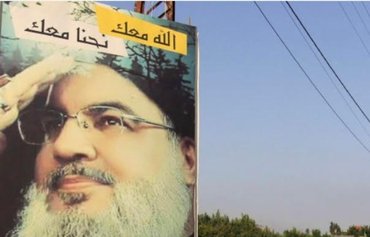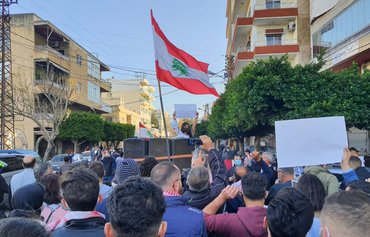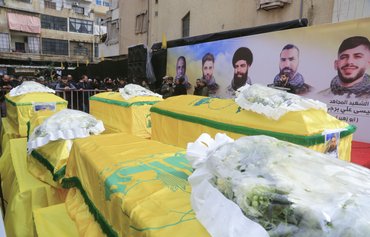BEIRUT -- Hizbullah-linked lawmakers are facing backlash in local communities where they once received support as the corruption within the group becomes increasingly apparent.
In one example, Anwar Jumaa, an MP with the al-Wafa lil-Muqawama (Loyalty to the Resistance) bloc, was asked on August 3 to leave the wake of a deceased Hizbullah element in the town of Rayak in the Bekaa.
Then on August 12, residents of his hometown, Ali al-Nahri, in Zahle, surrounded Jumaa's house and told him that he was persona non grata.
The following evening, a number of youth in the town assaulted MP Hussein Hajj Hassan at the Ashura Council held in the town in another example.
![A demonstrator holds up a sign reading in Arabic "your immunities" with shoes hanging underneath, during a protest at the port of Lebanon's capital Beirut on August 4, on the first anniversary of the blast that ravaged the port and the city. [Patrick Baz/AFP]](/cnmi_am/images/2021/09/07/31540-leb-immunity-600_384.jpg)
A demonstrator holds up a sign reading in Arabic "your immunities" with shoes hanging underneath, during a protest at the port of Lebanon's capital Beirut on August 4, on the first anniversary of the blast that ravaged the port and the city. [Patrick Baz/AFP]
Shia youths on August 15 protested at the house of MP Ali Ammar in Burj al-Barajneh in Beirut's southern suburbs (Dahye) because the lights were on at his house while district residents had no electricity.
Meanwhile, the head of al-Wafa lil-Muqawama, Mohammed Raad, was blocked by Shia residents from attending the Ashura Council in the town of al-Dweir, Nabatiyeh governorate, a Hizbullah stronghold, where he had been scheduled to deliver a speech.
The recent incidents stem from the public's growing awareness of the corruption within Hizbullah and its leaders, say opponents of the group.
"Hizbullah's crises began to emerge slowly after its integration into the Lebanese authority, and the more power Hizbullah gained, the more its problems multiplied," said a Shia religious scholar on the condition of anonymity.
"In the past, these crises were not visible, and were rather hidden," he said.
Hizbullah "appears to be the most powerful force on the Lebanese scene today, while in reality, it is the weakest", the scholar said.
"The party realised early on that the Lebanese revolution [of October 2019] would overthrow it, so its Secretary General Hassan Nasrallah took a negative stance against the revolution and fought it, because he knew it would have a significant impact on him."
"As long as there are illegal weapons in the hands of Hizbullah, there will be no stability in Lebanon, and this will aggravate the popular objection to it," the scholar said.
Disagreements come to light
Hizbullah "is currently experiencing an existential crisis that it hasn't faced since its founding and inception in 1985, when it represented a jihadist resistance for the sake of the homeland, the nation and the sect, as its media professionals propagandise", Southerners for Freedom co-ordinator Hussein Ataya said.
"We find in the party's ranks corruption at every level," he said, citing the seizure of village commons and of victims' compensation for the war of June 2006, and today the hoarding and monopolising of gasoline, domestic gas and diesel.
"These actions caused some in Hizbullah's traditional base to break away from it and attack the party's MPs in their strongholds."
Raids conducted by the army and security forces on gas stations and oil derivative storage sites have revealed the extent of the involvement of Hizbullah leaders in monopolising and hoarding oil at gas stations that belong to relatives, according to Ataya.
Political writer Tony Boulos said Hizbullah, as a result of previous incidents, "has become shunned" by the other communities and groups in Lebanon.
The discontent over Hizbullah lawmakers "is evidence of the genesis of the formation of an opposition in the Shia environment against Hizbullah, which used the state and security services to suppress those who objected to its MPs", Boulos said.
The Shia base "is actually witnessing a change in the popular mood accompanied by activism against [Hizbullah], because now it knows the truth about it and that it is not a resistance [movement]", he said.
"The reality is that Hizbullah is an Iranian project and uses the Shia base and all the Lebanese as captives of this project."

![A Sunni Muslim cleric guides Friday prayers, held in a petrol station south of Beirut, on September 3, amid ongoing socioeconomic and political crises that many partly blame on Hizbullah. [AFP]](/cnmi_am/images/2021/09/07/31537-leb-fuel-prayer-600_384.jpg)






